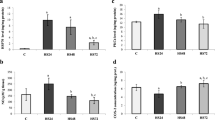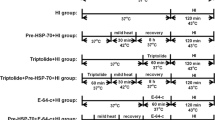Abstract
Heat stress pretreatment of the heart is known to protect this organ against an ischemic/reperfusion insult 24 h later. Degradation of membrane phospholipids resulting in tissue accumulation of polyunsaturated fatty acids, such as arachidonic acid, is thought to play an important role in the multifactorial process of ischemia/reperfusion-induced damage.
The present study was conducted to test the hypothesis that heat stress mitigates the postischemic accumulation of arachidonic acid in myocardial tissue, as a sign of enhanced membrane phospholipid degradation. The experiments were performed on hearts isolated from rats either 24 h after total body heat treatment (42°C for 15 min) or 24 h after sham treatment (control). Hearts were made ischemic for 45 min and reperfused for another 45 min.
Heat pretreatment resulted in a significant improvement of postischemic hemodynamic performance of the isolated rat hearts. The release of creatine kinase was reduced from 30 ± 14 (control group) to 17 ± 5 units/g wet wt per 45 min (heat-pretreated group) (p < 0.05). Moreover, the tissue content of the inducible heat stress protein HSP70 was found to be increased 3-fold 24 h after heat treatment. Preischemic tissue levels of arachidonic acid did not differ between heat-pretreated and control hearts. The postischemic ventricular content of arachidonic acid was found to be significantly reduced in heat-pretreated hearts compared to sham-treated controls (6.6 ± 3.3. vs. 17.8 ± 12.0 nmol/g wet wt). The findings suggest that mitigation of membrane phospholipid degradation is a potential mechanism of heat stress-mediated protection against the deleterious effects of ischemia and reperfusion on cardiac cells.
Similar content being viewed by others
References
Jennings RB, Murray CE, Steenbergen C, Reimer KA: Development of cell injury in sustained acute ischemia. Circulation 82(suppl II): II-2–II-12, 1990
Piper HM: Irreversible ischemic injury – Definition of the problem. In: HM Piper (ed). Pathophysiology of Severe Ischemic Myocardial Injury. Kluwer Academic Publishers, Dordrecht, The Netherlands, 1990, pp 3–14
Post JA, Ruigrok TJC, Verkley AJ: Phospholipid reorganisation and bilayer destabilization during myocardial ischemia and reperfusion: a hypothesis. J Mol Cell Cardiol 20(suppl II): 107–111, 1986
Van Bilsen M, Van der Vusse GJ, Willemsen PHM, Coumans WA, Roemen THM, Reneman RS: Lipid alterations in isolated, working rat heart during ischemia and reperfusion: Its relation to myocardial damage. Circ Res 64: 304–314, 1989
Currie RW, Karmazyn M, Kloc M, Mailer K: Heat-shock response is associated with enhanced post-ischemic recovery. Circ Res 63: 543–549, 1988
Welch WJ: Mammalian stress response: Cell physiology, structure/function of stress proteins, and implications for medicine and disease. Physiol Rev 72: 1063–1081, 1992
Cornelussen R, Spiering W, Webers JHG, De Bruin LH, Reneman RS, Van der Vusse GJ, Snoeckx LHEH: Heat-shock improves the ischemic tolerance of the hypertrophied rat heart. Am J Physiol 267: H1941–H1947, 1994
Meersson FZ, Malyshev IY, Zamotrinksky AV, Kopylov YN: The role of hsp70 and IP3-DAG mechanism in the adaptive stabilization of structures and heart protection. J Mol Cell Cardiol 28: 835–843, 1996
Chien KR, Han A, Sen A, Buja LM, Willerson JT: Accumulation of unesterified arachidonic acid in ischemic canine myocardium. Circ Res 54: 313–322, 1984
Das DK, Engelman RM, Rousou JA, Breyer RH, Otani H, Lemeshow S: Role of membrane phospholipids in myocardial injury induced by ischemia and reperfusion. Am J Physiol 251: H71–H79, 1986
Van der Vusse GJ, Roemen THM, Prinzen F, Coumans WA, Reneman RS: Uptake and tissue content of fatty acids in dog myocardium under normoxic and ischemic conditions. Circ Res 50: 538–546, 1982
Van der Vusse GJ, Glatz JFC, Stam HCG, Reneman RS: Fatty acid homeostasis in the normoxic and ischemic heart. Physiol Rev 72: 881–940, 1992
Snoeckx LHEH, Van der Vusse GJ, Van der Veen F, Coumans WA, Reneman RS: Recovery of hypertrophied rat hearts after global ischemia and reperfusion at different perfusion pressures. Eur J Physiol (Pflügers Archiv) 413: 303–312, 1989
Bergmeyer HU, Bernt E: UV assay for creatine kinase. In: HU Bergmeyer HU (ed). Methods of Enzymatic Analysis. Verlag Chemie GmbH, Weinham, 1974, pp 784–788
Van der Vusse GJ, Roemen THM: Gradient of fatty acids from blood plasma to skeletal muscle in dogs. J Appl Physiol 78: 1839–1843, 1995
Morrison WR, Smith LM: Preparation of fatty acid methyl esters and dimethylacetals from lipids with boron fluoride-methanol. J Lipid Res 5: 600–608, 1964
Cornelussen RN, Garnier AV, Vork MM, Geurten P, Reneman RS, Van der Vusse GJ, Snoeckx LHEH: Heat stress protects aged hypertrophied and nonhypertrophied rat hearts against ischemic damage. Am J Physiol 273: H1333–H1341, 1997
Maulik N, Engelman RM, Wei Z, Lui X, Rousou JA, Flack JE, Deaton DW, Das DK: Drug-induced heat-shock preconditioning improves postischemic ventricular recovery after cardiopulmonary bypass. Circulation 92: II381–II388, 1995
Maulik N, Watanabe M, Engelman RM, Kagan VE, Kisin E, Tyurin V, Cordis GA, Das DK: Myocardial adaptation to ischemia by oxidative stress induced by endotoxin. Am J Physiol 269: C907–C916, 1995
Yellon DM, Pasini E, Cargoni A, Marber MS, Latchman DS, Ferrari R: The protective role of heat stress in the ischemic and reperfused rabbit myocardium. J Mol Cell Cardiol 24: 895–907, 1992
Radford NB, Fina M, Benjamin IJ, Moreadith RW, Graves KH, Zhao P, Ghawa S, Wiethoff A, Sherry AD, Malloy CR, Williams CR: Cardioprotective effects of 70-kDa heat shock protein in transgenic mice. Proc Natl Acad Sci USA 93: 2339–2342, 1996
Plumier JCL, Ross BM, Currie RW, Angelidis CE, Kazlaris H, Kollias G, Pagoulatos GN: Transgenic mice expressing the human heat shock protein 70 have improved postischemic functional recovery. J Clin Invest 95: 1854–1860, 1995
Nakano M, Mann DL, Knowlton AA: Blocking the endogenous increase in HSP 72 increases susceptibility to hypoxia in isolated adult feline cardiocytes. Circulation 95: 1523–1531, 1997
Van der Vusse GJ, Van Bilsen M, Reneman RS: Is phospholipid degradation a critical event in ischemia-and reperfusion-induced damage? News Physiol Sci 4: 49–53, 1989
Jäätela M: Overexpression of major heat shock protein hsp70 inhibits tumor necrosis factor-induced activation of phospholipase A2. J Immunol 151: 4286–4294, 1993
Lochner A, De Villiers M: Phosphatidylcholine biosynthesis in myocardial ischaemia. J Mol Cell Cardiol 21: 151–163, 1989
Author information
Authors and Affiliations
Rights and permissions
About this article
Cite this article
van der Vusse, G.J., Cornelussen, R.N., Roemen, T.H. et al. Heat stress pretreatment mitigates postischemic arachidonic acid accumulation in rat heart. Mol Cell Biochem 185, 205–211 (1998). https://doi.org/10.1023/A:1016574720342
Issue Date:
DOI: https://doi.org/10.1023/A:1016574720342




